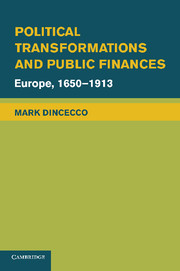Book contents
- Frontmatter
- Contents
- Figures and Tables
- Acknowledgments
- 1 Weak and Strong States in Historical Perspective
- 2 Gaining Force
- 3 Restricting Power
- 4 Political Regimes and Credit Risk
- 5 Two Mechanisms
- 6 Letting the Data Speak for Themselves
- 7 Estimating the Fiscal Effects of Political Regimes
- 8 The Institutional Balance of Modern Fiscal States
- Appendices
- Works Cited
- Index
1 - Weak and Strong States in Historical Perspective
Published online by Cambridge University Press: 07 October 2011
- Frontmatter
- Contents
- Figures and Tables
- Acknowledgments
- 1 Weak and Strong States in Historical Perspective
- 2 Gaining Force
- 3 Restricting Power
- 4 Political Regimes and Credit Risk
- 5 Two Mechanisms
- 6 Letting the Data Speak for Themselves
- 7 Estimating the Fiscal Effects of Political Regimes
- 8 The Institutional Balance of Modern Fiscal States
- Appendices
- Works Cited
- Index
Summary
Powerful fiscal states underlie today’s advanced economies in the West and beyond. Wealthy governments typically gather large tax revenues as shares of GDP and spend great sums on the military, infrastructure, and social programs. How rich European countries first established modern systems of public finance is a fundamental question in economic history. It is the key question that this book tackles.
The answer, which involves centuries of political reforms, wars, revolutions, defaults, technological change, and economic growth, has profound implications for current political debates. The financial meltdowns of the late 1990s in East and Southeast Asia and Latin America illustrate the vital links between fiscal policy and development. Beyond financial crisis, emerging economies also face fiscal problems resulting from the lack of tax resources available to provide basic public goods like transportation infrastructure. Yet fiscal troubles do not affect developing countries alone. One of the most pressing issues that advanced nations must confront over the coming decades is how to keep entitlement programs solvent. No country is immune to fiscal imperatives.
- Type
- Chapter
- Information
- Political Transformations and Public FinancesEurope, 1650–1913, pp. 1 - 9Publisher: Cambridge University PressPrint publication year: 2011



